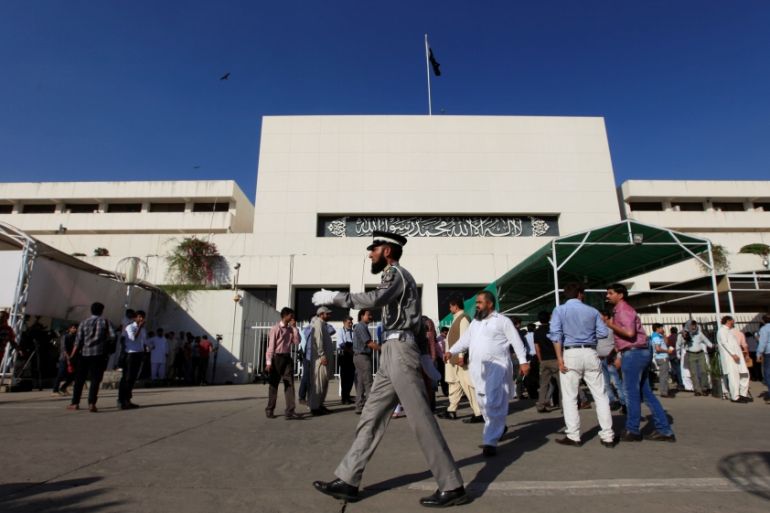Pakistan extends bail for journalist accused of ‘cyberterrorism’
Shahzeb Jillani is charged with ‘cyberterrorism’ for recent news coverage of enforced disappearances in the country.

Islamabad, Pakistan – A Pakistani court has extended the bail of a journalist accused of “cyberterrorism” for recent news coverage of enforced disappearances, in a case the rights group Reporters Without Borders (RSF) claimed “has been designed to intimidate and silence Pakistan’s journalists”.
Shahzeb Jillani, a journalist with local news channel Dunya News, appeared in a court in Karachi, Pakistan’s largest city, on Wednesday.
Keep reading
list of 4 itemsGeorgia advances ‘foreign agents’ bill as 20,000 rally against it
NPR editor resigns after accusing US outlet of liberal bias
Lawmakers brawl as Georgian Parliament considers ‘foreign agent’ bill
The journalist’s bail has been extended until April 24, when the next hearing in the case will take place, he told Al Jazeera shortly after proceedings concluded.
Jillani is accused by a viewer of “articulating defamatory remarks against the respected institutions of Pakistan” and has consequently been charged with cyberterrorism, according to a police report filed in the case.
He is being charged under draconian electronic crimes law passed by Pakistan’s parliament in 2016, which rights activists say have been used to silence dissent by criminalising criticism of the state and its institutions, including the country’s powerful military.
On Tuesday, RSF said in a statement that Pakistani journalists are facing “constant harassment” by the authorities.
‘Manipulating the laws’
“We urge the court to dismiss these charges against Shahzeb Jillani because, from the legal viewpoint, the case is completely inadmissible,” said Daniel Bastard, the head of RSF’s Asia-Pacific desk.
“Via the all-powerful Federal Investigation Agency, Pakistan’s authorities are yet again manipulating the laws in order to silence a journalist who dared to cross a red line by criticising certain institutions.
It is shocking to see how, little by little, case by case, the Pakistani security agencies are tightening their vice in order to intimidate the entire media profession into censoring themselves,” he said.
The RSF statement comes months after a Committee to Protect Journalists (CPJ) investigation found “the country’s powerful military quietly, but effectively, restricts reporting by barring access, encouraging self-censorship through direct and indirect acts of intimidation, and even allegedly instigating violence against reporters.”
The case centres on Jillani’s coverage of the issue of enforced disappearances, wherein he accused Pakistani security forces of being involved in cases of illegal abduction and internment of prisoners, mostly “terrorism” suspects.
A Pakistani government-mandated commission that investigates enforced disappearances currently has 2,178 cases pending before it, according to a February press release.
Last year, an Al Jazeera investigation documented 22 cases of such disappearances, including cases linked to alleged terrorism, criticism of the state and other forms of dissent.
Thousands of “missing people” have been traced by the commission as being in military custody in a network of internment centres where they can be held without charge indefinitely.
Objections were also lodged about Jillani’s criticism of the military’s alleged hand in “political engineering” during last year’s elections in Pakistan, which it has ruled directly for roughly half of its 71 years of independence.
The case against Jillani was filed by Muhammad Iqbal Haider, a Karachi-based lawyer who has regularly filed petitions challenging civilian political leaders and political parties in the past.
His repeated filing of petitions deemed to be “frivolous” saw him banned from entering the country’s Supreme Court for five years in 2017.
The Federal Investigation Agency (FIA) admitted the complaint earlier this month, according to a case report. The investigating officer said Jillani’s remarks on air and on social media site Twitter created “a sense of fear, panic, insecurity in the Government institutions, general public and society”.
“[Jillani] with the criminal intent and ulterior motives without any lawful justification spoke … sarcastic, derogatory, disrespectful and defamatory language against [state institutions],” wrote Akbar Khan Mahsood, the FIA official.
‘Convenient tool’
Pakistani digital rights groups say the FIA has generally enforced the law to quell dissent and has not been fulfilling its legal obligations when reporting on the use and enforcement of the legislation.
“The cybercrime law, its use and misuse is a convenient tool now for harassment through legal instruments,” said Farieha Aziz, cofounder of digital rights group Bolo Bhi. “Such cases have their own nuisance value. Having a case against you means you must engage a lawyer, secure pre-arrest bail – or if arrested then post-arrest – and manoeuvre through the criminal justice system.”
Aziz called the case against Jillani “particularly absurd” as the remarks occurred on a television programme, a medium not covered by the electronic crimes act.
In a stinging editorial on Wednesday, Pakistan’s leading English-language newspaper Dawn, which itself has been repeatedly targeted by authorities for coverage of the military and armed groups, said, “The sword of Damocles looms over Pakistan’s independent press.”
“The charge sheet [against Jillani] reads like quintessential McCarthyism; criticism is conflated with subversion, and unsubstantiated allegations of collusion with ‘foreign agencies’ of ‘enemy countries’ have been made with no corroborating evidence to support them,” the editorial said.
Asad Hashim is Al Jazeera’s digital correspondent in Pakistan. He tweets @AsadHashim.